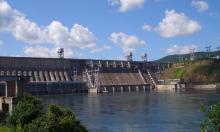Merkel and Sarkozy work out new proposal for greater budget discipline
 Britain's FTSE 100 were higher on Thursday morning ahead of interest rate decisions from the British and European Union central banks and an EU summit, where it was hoped a deal will be struck to end the euro zone's two-year debt crisis.
Britain's FTSE 100 were higher on Thursday morning ahead of interest rate decisions from the British and European Union central banks and an EU summit, where it was hoped a deal will be struck to end the euro zone's two-year debt crisis.
The benchmark index was up 12.10 points, or 0.2 percent, to 5,559.01 by 0918 GMT, having fallen 0.4 percent on Wednesday. Miners led Britain's top share index higher, helped by a swathe of broker comment, says Reuters.
Traders said any moves were likely to be tentative until something official comes out of Europe, with the summit set to conclude on Friday. For the time being, the index was seen in the 5,500-5,600 range of the past six trading days.
Investors hoped that if European governments can agree to tighter spending oversight, the ECB will step up its support for the bond markets. It currently buys bonds in the markets, but only reluctantly, and in small quantities.
"The ECB has made it clear that the sequencing of events is all-important, a hint that if the EU takes a significant step towards more fiscal discipline then it will continue to support the market in size and maybe in words as well," said Gary Jenkins, an analyst at Evolution Securities.
"Let's hope what is decided is enough to keep the ECB satisfied, so that it keeps up its support for markets," he added, reports Washington Post.
Merkel and Sarkozy have spent much of this week working out new proposals for greater budget discipline and more fiscal integration in the EU. "It's going to be a matter of a promise and whether that promise is realized or not," Dan Morris, Global Strategist, JP Morgan Asset Management, told CNBC.
"All of this is going to play into volatility and given that it's going to be so news-driven and driven by unpredictable politicians, knowing when the next bomb drops is going to be very difficult.", accoding to CNBC.com.
One proposal is to create a new "assembly of national budget committees" to police the actions of the European Commission. Simply giving a bigger say to the European parliament is not good enough. National parliamentarians will hate having their European counterparts having a greater say over their national budgets than they do. The irony of the financial crisis is that the markets, not the politicians, have pushed the EU - or at least the eurozone - down the path of ever closer integration. The politicians' dilemma is how to make the answer both credible and legitimate, without breaking their union apart, informs Financial Times.
Subscribe to Pravda.Ru Telegram channel, Facebook, RSS!




